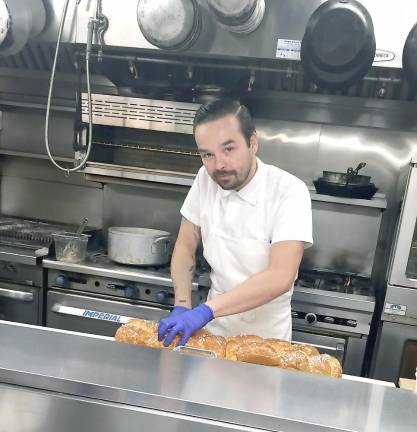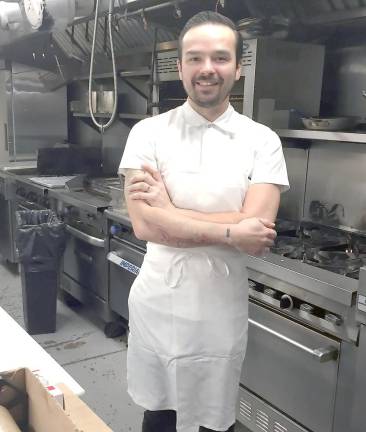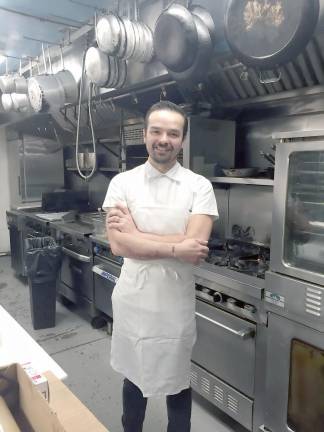Fauchère's new chef plans American Indian tasting dinner
Milford. Bryce Stevenson, a native of the Red Cliff Ojibwe reservation, is planning a seven-course feast. This special dinner will be an immersive cultural experience, complete with native songs, poetry, and erudite discussions of the food being served and of the Ojibwe language.



Say “aaniin” (“hello” in Ojibwe) to Bryce Stevenson, the new chef de cuisine at the Hotel Fauchère in Milford, Pa. He'll be preparing a special seven-course tasting dinner in the Delmonico Room on Jan. 3 featuring, among other dishes, venison (“waawaashkeshiwi-wiiyaas”) rabbit (“waabooz”), and wild rice (“manoomin").
Stevenson grew up on the Red Cliff Ojibwe reservation in northern Wisconsin. This talented, sophisticated young man is bilingual and bicultural in Ojibwe and English, with some French in the mix. He lived on the reservation until he was 13 or 14, and then traveled back and forth between Wisconsin and Illinois. His family still lives on the reservation.
He has a degree in graphic design and English and was also in the American Indian Studies program at University of Wisconsin at Milwaukee. (It’s cool to say “American Indian” in this part of the country.) After university, Stevenson decided he wanted to give back to his people, so he returned to the reservation to learn more about life there. He fell in love with the food and began exploring the fundamentals of Ojibwe cuisine, adding some French elements here and there. Stevenson studied everything he could about fine cuisine. He also learned that “food is about family, and family is about food.”
Stevenson knew about Milford's Hotel Fauchère and wrote to its owner, Sean Strub.
“It was serendipity at its finest, since my father’s name is ‘Milford Stevenson’ and there is a ‘Bryce House’ in Milford," Stevenson said.
He came to the Fauchère in September with his fiancée, Jessica Principali, who is in marketing and public relations.
Stevenson is impressed with the interest that the people here have in other cultures, and their ready acceptance of newcomers.
A very special dinner
The Jan. 3 tasting dinner will be an immersive cultural experience, complete with native songs, poetry, and a discussion about the food being served.
Meg Noodin, a professor of linguistics at the University of Wisconsin at Milwaukee is Ojibwe and will talk about the Ojibwe language. Michael (Miishin) Zimmerman, who will accompany Noodin, is Potawotami and teaches Indian languages to children in a private mission school.
The courses
1. An amuse — smoked whitefish, purple potato, fried leek
The first course of whitefish is an “amuse,” a French tradition in which the chef chooses a a small bite of something. It is not an appetizer.
2. Roasted kabocha squash, red corn, trout beans, fried sage, dandelion greens, cranberry vinegar
The second course is a salad. Its trout beans are a native variety of bean, sometimes referred to as “Joseph’s cattle." Similar to kidney beans, they are speckled.
3. Maple-glazed sunchoke, baby sweet potato, smoked turnip, gooseberry jam, sumac
The third course is a variety of root vegetables, including sunchokes, also known as Jerusalem artichokes.
4. Cedar smoked rabbit, chaga & chocolate, black trumpet, strawberry
5. Charred venison, wild rice risotto, fermented blueberry, sweetcorn, amaranth crumble
The fourth and fifth courses are a light protein and a heavier protein, respectively.
6. Sweetgrass soda
7. Ojibwe fry bread, butternut squash, maple candy, blackberries
The sixth course, sweetgrass soda, is a drink meant to cleanse and prepare the palate for the seventh and final course, a very sweet, rich dessert.
Stevenson welcomes everyone to partake in this gastronomic experience. He wishes one and all “bon appetit,” or, in Ojibwe, "mino-wiisinidaa," which means, literally, “Eat good!"
A little primer on these native languages: The Anishinaabe language (meaning “the good people”) is one of about 17 Algonquin languages. Anishinaabe has three main dialects: Potawotami, Odawa, and Ojibwe. The language originally did not have a writing system, but missionaries developed one using the Roman alphabet. There are many words with double vowels, such as ii, aa, uu. These are different sounds than their single vowel sounds (i, a, u). Currently there are many efforts to teach and maintain the native languages, not only on the reservations, but for anyone who wants to learn them. The You Tube video at bit.ly/2YI9oMM has a great course on Ojibwe.